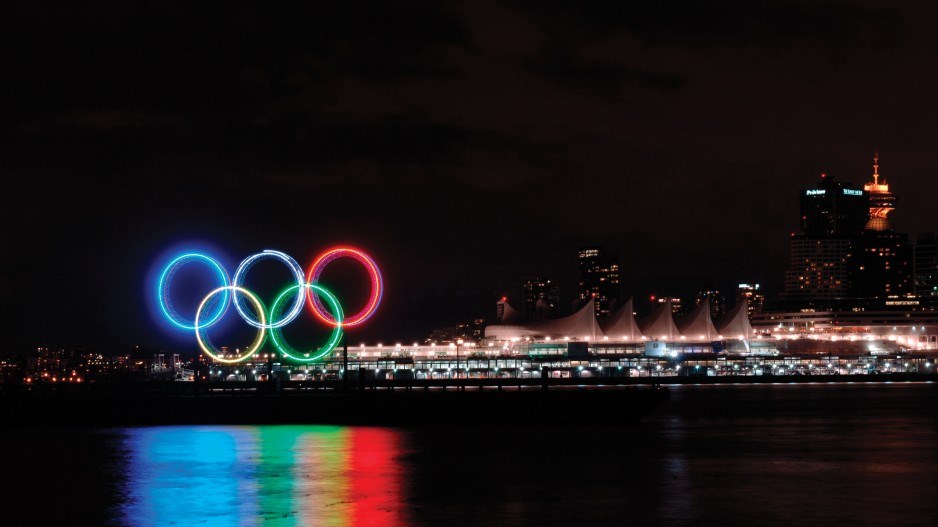Blue skies and golden sunsets during the Vancouver 2010 Winter Olympics became a deluge of opportunity for B.C.’s tourism and real estate industries.
A freak weather system in the El Niño year raised temperatures and kept rain clouds away for many of the Games’ 17 days. An estimated 1.8 billion TV viewers around the world were watching. With mega-cities like Beijing and Shanghai often shrouded in smog, the images of clear Vancouver skies did not go unnoticed by tens of millions of Chinese viewers.
China is now B.C.’s second-biggest source of international tourists, and real estate investors from China have shaken up Vancouver’s residential housing market.
The stage was set in Beijing, 18 months earlier, where national pride in China’s athletes reached a zenith and the five-ring brand resonated across the Middle Kingdom. After the cauldron was extinguished August 24, 2008, Vancouver, on February 12, 2010, was the next place where the Chinese flag was paraded into an Olympic stadium.
Canada’s ambassador to China, David Mulroney, hosted a reception in Beijing in November 2009 to mark the 100-day countdown. The next month, prime minister Stephen Harper met with president Hu Jintao, who agreed to add Canada to its list of approved tourist destinations. That made it easier for Chinese to travel abroad and for Canada’s tourist industry to advertise in China.
The Vancouver-based Canadian Tourism Commission cleverly gave two Chinese speedskating champions spots in the Vancouver 2010 torch relay, which also gained media attention back in China.
Two days into the Vancouver Olympics, the lunar Year of the Ox gave way to the Year of the Tiger. Like Christmas in Canada, China’s spring festival is a time when the television becomes a place to gather around. For the first time, state broadcaster CCTV signed a direct contract with the International Olympic Committee, an arrangement that treated Chinese to more Winter Olympics coverage than ever before, on TV and online.
China’s biggest Winter Games team of 182 athletes competed in 10 of the 15 sports and brought a record five gold, two silver and four bronze home. Figure-skating duo Shen Xue and Zhao Hongbo won China’s first gold in that sport at the Pacific Coliseum. Today, photographs of China’s Vancouver 2010 medallists are prominently displayed at an Olympic museum in Zhangjiakou, the city outside Beijing that will co-host the 2022 Winter Games.
Statistics Canada estimated that, countrywide, there were 160,000 overnight trips by Chinese tourists in 2009, with $261 million in receipts. By 2012, that jumped to 273,000 trips by Chinese tourists, who spent a total of $487 million.
By 2013, China became the second-largest international tourist market, up from fifth place the previous year. Between 2004 and 2013, Chinese tourist visits to Canada zoomed 246%. Over 10 months in 2015, Tourism Vancouver recorded 213,845 overnight stays by Chinese. That is comparable to almost the entire 12-month total from 2014, when there were 229,654 overnight stays.
Many have decided to buy a piece of the city, but nobody knows how much of the Bloomberg-estimated US$1 trillion that flowed out of China in 2015 landed in Vancouver. We do know that, six years ago, the benchmark price for a detached house in Greater Vancouver was $813,800. As of January 2016, it was $1,273,100.
South of the border, the National Association of Realtors reported last June that buyers from China, Hong Kong and Taiwan bought $28.6 billion of U.S. property in 2015, up from $11.2 billion in 2010. Most purchases were all-cash and in city centres and suburbs.
On February 17, the Financial Post reported that Anbang Insurance Group Co. Ltd. of Beijing would pay $1 billion for IvanhoéCambridge’s two-thirds stake in four of the Bentall towers, a record Vancouver deal.
Last November, urban planner Andy Yan researched the September 2014 to February 2015 sale records of 172 Point Grey, Dunbar and University Endowment Lands single-family houses. He found two-thirds of the buyers had non-anglicized Chinese names.
Likewise, an April 20, 2014, BC Supreme Court filing by Wall Centre (Point Grey) Developments Ltd. showed only seven English or anglicized names on a list of 97 pre-sales deposits worth $10.2 million. The rest of the list included names like Li Li, Rongxia Gao and Dong Mei Ding.
Vancouver’s Olympic Village went into receivership and took an extra four years to pay off. The Richmond Olympic Oval and Vancouver Olympic Centre evolved into multi-sport recreation centres. The Vancouver Convention Centre, Sea to Sky Highway and Canada Line are other tangible legacies.
But, six years on, look no further than the housing and hotel boom for the biggest legacy of the 2010 Games. •
Bob Mackin is the author of the 2012 ebook Red Mittens & Red Ink: The Vancouver Olympics (published by Smashwords, www.smashwords.com/books/view/132290) and has covered two Winter Olympics, two Summer Olympics, two Pan American Games and two Commonwealth Games for Canadian and international media outlets.




